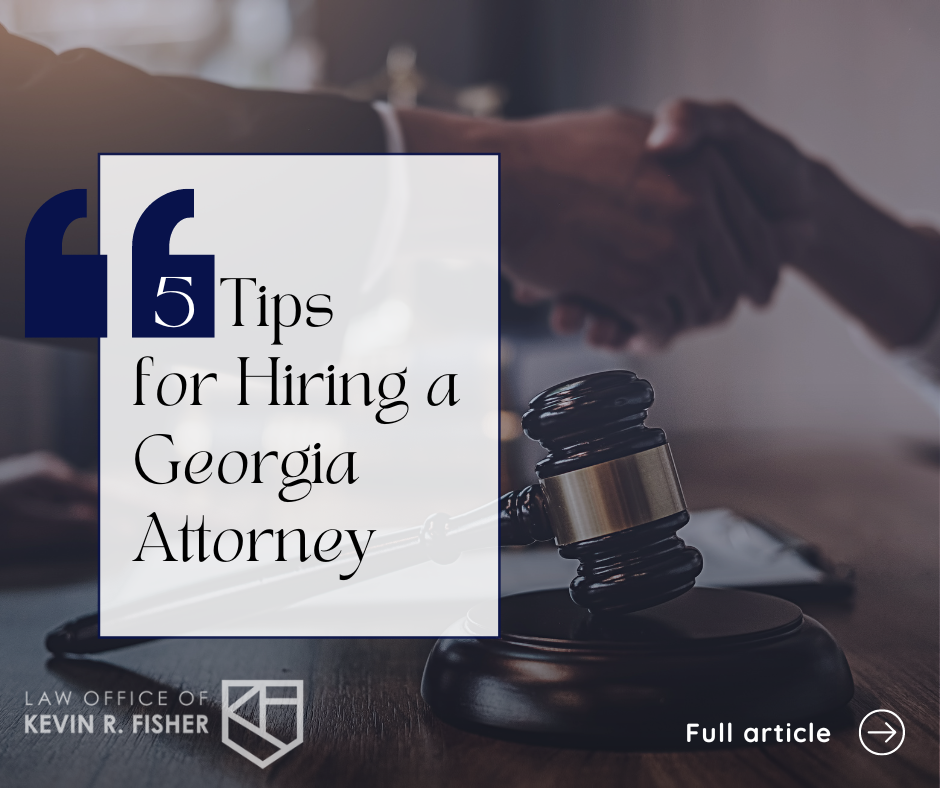On top of the stress of being summoned to court, hiring an attorney can be extremely stressful. There are so many out there. How do you choose a good one? What questions should you ask? In this blog post, you’ll learn five essential tips for hiring a Georgia attorney. This is part one of a series, so be sure to check back next week for more tips!
1. Figure out if you need a lawyer in the first place.
There are a few circumstances where it might be possible to handle a legal matter without an attorney. For example, if someone sues you for a small amount of money in small claims court and you do not wish to fight the case, you might decide that you don’t need an attorney (though I would pretty much always advise seeking counsel).
For criminal matters, it’s always a good idea to talk to a lawyer. Think about it. In criminal court, your opponent – the prosecutor – is a lawyer. Hiring a lawyer yourself is just leveling the playing field between yourself and the State.
Even if you are “only” facing a traffic charge, you still should be aware of the possible consequences. Many people don’t realize this, but traffic offenses are usually misdemeanor criminal offenses. Misdemeanors in Georgia carry a possible sentence of up to 12 months in jail, plus a fine of up to $1,000 (plus court costs and fees).
In addition to criminal penalties such as jail time, fines, and probation, criminal matters – even seemingly minor ones – can also have collateral consequences. These collateral consequences may not be immediately apparent to someone who isn’t a lawyer. Criminal convictions can impact your housing, employment, immigration status, insurance rates, and ability to qualify for some social services.
A good attorney doesn’t just analyze the facts of your case. They take the time to learn about your life circumstances and your priorities. That way, they can anticipate the consequences and help you understand them. Then you can make an informed decision about how to proceed with your case.
They can also help you achieve an outcome that impacts your life the least. For some people, that may involve going to trial to prove their innocence. Others may just want to resolve the matter as quickly as possible. Every client is different, so look for a lawyer who understands that.
2. Determine whether the lawyer is a specialist or a generalist.
Search for attorneys in your area. Once you have done a Google search and found one that looks promising, you can start your investigation. First, determine whether they are a specialist or a generalist.
Generalists practice many different types of law. That means they may be working on a criminal case one day, an employment law case the next, and a family law case the day after that. To be clear, this doesn’t mean that generalists are bad lawyers. However, because their practice is so varied, they almost certainly have less experience in one particular field of law than a lawyer who specializes.
Specialists, by contrast, have experience and training in particular kinds of cases because they dedicate their entire practice to that field. This is especially important in criminal cases and cases where scientific (or pseudo-scientific) evidence comes into play, such as DUI cases.
To determine whether an attorney is a generalist or a specialist, look at their website. Do they have any specialized training?
For example, I list on my website that I have completed the same DUI training course as Georgia State Patrol Officers do, and am certified in DUI Detection and Standardization Field Sobriety Testing. I have also completed courses in Impaired Driving Chemical Testing and the Intoxilyzers 5000EN and 9000. This tells you that, because I have taken the time to learn everything I can about DUI practice, I have spent a good deal of time dedicated to DUI law.
You can also look at whether they are involved in any legal organizations. For example, I’m a member of the Georgia Association of Criminal Defense Lawyers and the National College for DUI Defense. This is a good indicator that I spend most of my practice working on criminal cases.
If you can’t figure out whether the attorney you’re looking at is a specialist or a generalist, remember, you can always ask them!
3. Make sure they have handled cases in your jurisdiction.
When you are trying to figure out if a lawyer is a good fit for you, you want to make sure they have handled cases in your jurisdiction.
Georgia has 159 counties. Within those counties, there are approximately 350 municipalities. Each has its own court system, and each court system runs a little differently. You want your attorney to be familiar with the quirks of the court where your case will be heard.
For example, judges require defendants to be present for arraignments in some jurisdictions, while others allow attorneys to handle them without their clients’ presence. You don’t want to end up with a bench warrant because your attorney was unaware of these procedures!
It’s also helpful for your attorney to understand the personalities of the prosecutor and the judge. This way, they can give you more insight into the likely outcome in your case. For example, if your attorney has worked with a particular prosecutor before, they know whether the prosecutor is willing to negotiate or whether they will never reduce charges.
Then, you can make a more informed decision about how to move forward.
Click here for a complete list of the counties I serve in the State of Georgia.
4. Read reviews.

You’ll want to find an attorney who has a proven track record of success. For this, you can turn to attorney reviews. The most persuasive reviews, in my opinion, are ones from former clients.
Client reviews can tell you how effective the attorney is at getting charges dismissed or reduced or winning cases at trial. Reviews will also give you insight into the attorney’s professionalism, communication style, and personality.
Of course, you can look for reviews on popular sites like Yelp and Google. However, it can also be helpful to check reviews on sites specifically geared towards people looking for lawyers. These include FindLaw and Avvo.
Here’s a link to my Avvo page.
If you’re still looking for more information about a lawyer, you can check out SuperLawyers. Attorneys listed as SuperLawyers are nominated by fellow lawyers. The SuperLawyers organization vets the attorney, considering their track record, experience, honors/awards, and other achievements.
5. Get a consultation.
Once you have done your investigation and chosen a few potential lawyers, you’ll want to get a consultation. Many Georgia lawyers – including myself – offer free or low-cost consultations to potential clients.
It’s great to read reviews from other people, but a consultation allows you to ask questions and vet the attorney yourself. Nothing trumps first-hand impressions. Feel free to ask about the attorney’s training and experience, and make sure they are familiar with your jurisdiction.
Many potential clients are tempted to ask about outcomes in similar cases. I advise caution with that because results are very dependent on individual facts and circumstances. A lawyer is trained to evaluate all of those facts and circumstances individually and to get the best possible results for your particular case. So comparing your case to someone else’s may be a bit like comparing apples to oranges.
Read more…
Check back next week for Part 2 of this series, entitled “Five (More) Tips for Hiring a Georgia Attorney.” There you’ll learn the things you should be asking potential attorneys.

